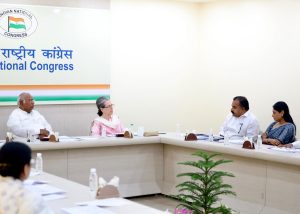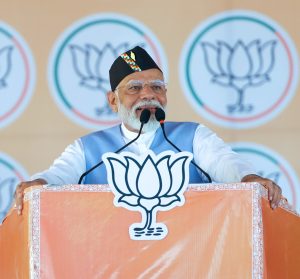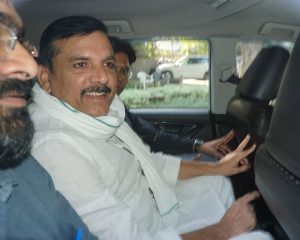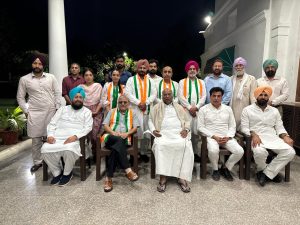Good of Politics: Narendra Modi recall Rajiv Gandhi contribution to nation on his birth anniversary
Good of Politics: Narendra Modi recall Rajiv Gandhi contribution to nation on his birth anniversary
NEW DELHI (INDIA): Prime Minister of India Narendra Modi today remembered late former Prime Minister Rajiv Gandhi and his contribution to the nation on his birth anniversary.nn”On his birth anniversary, we remember former PM Shri Rajiv Gandhi & recall his contribution to the nation,” Modi tweeted.nnHe was the son and successor of the late Prime Minter Indira Gandhi. He was the sixth Prime Minister of India serving from a period between 1984-1989.nnRajiv Gandhi builder of the 21st Century IndiannGandhi, India?s youngest Prime Minister, till date in a short span of seven years, left an indelible mark of achievement, development and a constructive roadmap for an emerging nation to deliver in the 21st Century, with a strong foundational plinth. Inarguably, ?the Rajiv era? can be regarded as the most distinguished period of initiating sets of break through reforms involving, India?s modernization, economic liberalization, inclusive growth, democratic decentralization, co-operative federalism, technological advancement, resource-based agricultural growth; economic reform andnthe concept of India as an emerging and independently great power. The young PM built institutions with utmost care and extreme sagacity.nnHe conceived India as a global power, an experience we are witnessed to in the 21st century world. Shri Gandhi initiated substantial changes in the economic policy framework. The first step towards liberalization of the economy in India, was taken up by Rajiv Gandhi and balanced the fast change with unparalleled stability. After he became the Prime Minister, a number of restrictions on various sectors were eased, control on pricing was removed, and stress was given on increased growth rate and so on.nnThe new reforms led to easier international trade and investment, privatization, deregulation, inflation controlling measures and tax reforms. Liberalization has been the same irrespective of which party headed the government. Beginning in the 80s, the government led by Rajiv Gandhi started well-calculated light reforms. These reforms were to set the firm foundations for future economic reforms.nnThe government slightly reduced Licence Raj and also promoted the growth of the telecommunications and software industries .His policies of de-licensing and reform of major industries resulted in better capacity utilization, capital cost cutting, maximum of capital utilization. He was apt in calculating dividends in pushing the Indian economy on a higher growth path. The early 1990s would prove his foresight to be true.nnRajiv Gandhi, a visionary of modern India, had no patience for empty and populist rhetoric. He was committed to infuse efficiency and competitiveness in the stagnating public sector. reversing the trend of expanding public sector could have won him ownership and state intervention in economic activity and strongly supported the expanding role of private business including its takeover of non-performing public sector enterprises.nnRajiv Gandhi saw rapid economic growth as a principal instrument of ensuring dignified place for india as a Global power. Still his concept of growth was not bereft of distributive justice. He aimed and worked to make fruits of high growth rate as inclusive as possible. He saw clearly that rapid economic growth that generated much needed employment was the only real means to uplift the people while at the same time keeping intact their self-dignity and building the economy?s productive capacity.nnGandhi travelled the length and breadth of the land, learnt and matured from the crucible, that is, India. He had the remarkable faculty to go from local realities back to his larger framework and ideals and back again. He was open and took along individuals with contrarian ideas. During his tenure as Prime Minister of India, he infused a dynamism and new spirit into the premiership.nnHe is credited with promoting the introduction of computers in India. He had the vision and foresight to see that information technology will play a key role in the 21 century and worked actively to develop India?s capacity in this realm. In his words ?India having missed industrial revolution cannot afford to miss the ?Computer revolution?. Undoubtedly, the seeds of revolution in Information technology were sown during his tenure. Today we are reaping the fruits of this revolution in the form of economic growth, rising international profile, improved governance, efficient delivery of public services and many more.nnRajiv Gandhi?s scientific temper is attested to by the fact that there was increased governmental support for science and technology and associated industries, and reduced import quotas, taxes and tariffs on technology- based industries, especially computers, airlines, defence and telecommunications. In his scientific temper he stands as a true carrier of Nehruvian legacy.nnIn 1986, Rajiv Gandhi announced a national education policy to modernize and expand higher education programs across India.A right value system must be built into our education system.nnHe had a vision to see the developments in larger perspective while not being oblivious of the locally – felt needs, aspirations and the realities. For this he wanted plans to be flexible and attuned to the time, context and requirements.nnAs an astute administrator, he sought to address modern ?divides?. The divides such as rural- urban, digital divide, regional disparities that tends to obfuscate the growth with distributive justice. For him the most important ingredient of a nation- building process is rural development. This entails eradication of poverty among the farmers.nnAccording to him, as long as farmers remain poor, the nation cannot grow and be self-reliant. Rural povery- alleviation was not just his administrative priority but a personal dream. If farmers become weak the country looses selfreliance but if they are strong, freedom also becomes strong. If we do not maintain our progress in agriculture, poverty cannot be eliminated from India.So the main thrust of Rajiv Gandhi?s alleviation programmes was on the uplift of the farmers.nnIndia is a democracy where people are the masters.Gandhi could foresee the perilous effect of any concentration of power and decision-making at one centre. For him solution lies with the decentralization as an important instrument of ensuring democracy at grassroot level. It was Gandhi?s views regarding decentralization that became guiding spirit behind the enactment of 73rd constitutional amendment act in 1991 and according of constitutional status to the PRIs. Steps taken by him made Panchayati Raj system in India, functional in true sense.nnAs a visionary he could see that the process of development and nation- building could fructify only through ensuring ?power to people? and deepening of Indian Democracy thereby. For him, along with legislation from the top what is essential is mobilization from the below .As an acute observer of Indian socio- political realities he could foresee that fortune lies at the bottom and not the top of pyramid.nnAccording to him, for development to become a reality the development administration needs to be overhauled both in form and orientation .In a short span he could gain considerable experience insight and understanding of Indian politico -administrative culture and the malaise that corrodes governance. Once he himself said that out of a rupee spent by the government on various schemes only 15 paisa reached to the poor and needy. So for him the solution lies with a people- friendly and responsive administration.nnHe worked towards reducing the red tape in the governance and freeing administration from bureaucratic tangles. He made a valuable contribution in the modernization of Indian administration.nnHe said, that the world is changing much too fast for us to have a moribund system which is not flexible, which cannot evolve and develop with changes in our society, in our country, as they come about in the world.nnGrowth trajectory of Indian secularism has an organic linkage with our ancient past. Plurality and sense of accommodation of diversities is something well ingrained in Indian culture. Fully dedicated to strengthen this secular tradition of India Gandhi strongly suggested that we must be very clear that religion and politics must be separated and there must be a very clear definition of the difference between spirituality of the religion and its rituals and dogmas. Further, there should be a clear understanding on secularism that it is not anti- religion or non- religion; it is just the separation of government from religion. For him, thus the religion has a great role to play in the development process of our nation and we should do nothing to undermine it.nnWhat distinguish us from others is our tolerance. Tolerance has been one such important socio-cultural heritage we have inherited from the past and has been largely preserved during India?s struggle for independence under the leadership of Indian National Congress. He called for a united front against communal forces must be fought unitedly. In his words only ?We are the heirs to Gandhiji?s heritage of communal harmony; to Panditji?s scientific outlook; and to Indiraji?s struggle against the forces of destabilization terrorists, separatists, and communalists. We cannot fail them. Communalism must not be used as a political tool?.nnNo less significant is his understanding of various social malaises that afflict Indian society. One such malaise is Casteism and caste-based discrimination. He visualized a casteless society. He sought to carry forward the message and efforts of Mahatma Gandhi for upliftment of poor and weaker sections of society.nnGandhi was born on this day in 1944 and was assassinated in Sriperumbudur, near Madras, in Tamil Nadu, India on Tuesday, 21 May 1991.




